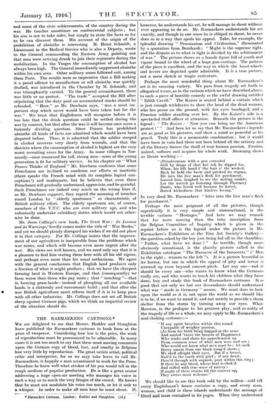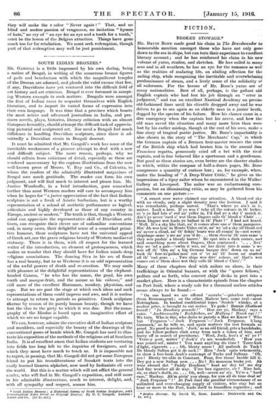THE RAEMAEKERS CARTOONS.* WE are delighted to see that Messrs.
Hodder and Stoughton have published the Raemaekers cartoons in book form at the price of twopence. Considering how low is the price, the work of reproduction must be pronounced to be admirable. In many cases it is not too much to say that these most moving comments upon the German orgy of blood, lust, and cruelty in Belgium lose very little by reproduction. The great satiric artist, political critic and interpreter, for so we may take leave to call Mr. Raemaekers, is happily a man acemstomed to work for the Press. Therefore he knew well what strokes of his pen would tell in the rough medium of popular production. He is like a great orator addressing a huge open-air meeting who manages his voice in such a way as to reach the very fringes of the crowd. He knows that he must not modulate his voice too much, or let it sink to a whisper. In order to make all men hear he must shout. If, • Raeniacters Cartoons. London : Hodder and Stoughton. [24.] however, he understands his art, he will manage to shout without ever appearing to do so. Mr. Raemaekers understands his art exactly, and though in one sense he is obliged to shout, he never does so in a way that spoils his appeal. Take, for example, the splendid drawing " Prussianism and Civilisation," illuminated by a quotation from Bernhardi : " Might is the supreme right, and the dispute as to what is right is decided by the arbitrament of war." The picture shows us a female figure full of youth and vigour bound to the wheel of a huge gun-carriage. The pattern of the piece is excellent, and the way in which the hand-wheels and levers are depicted quite admirable. It is a true picture, not a mere sketch or tragic caricature.
Perhaps the most wonderful thing about Mr. Raemaekers's art is its amazing variety. We pass from tragedy set forth in allegorical terms, as in the cartoon which we have described above, to such a piece of horrible comedy as the awful drawing entitled "Edith Cavell." The Kaiser is seated behind a curtain which
is just enough withdrawn to show the head of the dead woman, who lies prone on the ground, with her eyes bandaged, and a Prussian soldier standing over her. By the Kaiser's side is a spectacled Staff officer at attention. Beneath the picture is the legend : "The Kaiser : 'Now you can bring me the American protest ! ' " And here let us say that Mr. Raemaekers's legends are as good as his pictures, and show a mind as powerful as his pencil. Truly this is a memorable combination ; but it would have been in vain had there not been behind all the artistry and all the literary finesse the thrill of true human passion. Passion, indeed, suffuses and inspires his whole work. Browning shows
us Dante working :— " (Peradventure with a pen corroded
Still by drops of that hot ink he dipped for, When, his left hand e the hair o' the wicked, Back he held the brow and pricked its stigma, Bit into the live man's flesh for parchment, Loosed him, laughed to see the writing rankle, Let the wretch go festering through Florence) Dante, who loved well because he hated, Hated wickedness that hinders loving."
In very deed Mr. Raemaekers "bites into the live man's flesh
for parchment."
Perhaps the most poignant of all the pictures, though superficially it is very simple and unsensational, is the terrible cartoon "Hostages." And here we may remark that far more moving than the trite inscription from the Belgian Committee of Inquiry which is given in the reprint before us is the legend under the picture in Mr. Raemaekers's Exhibition at the Fine Art Society's Gallery— the question asked by the boy just being led off to the shambles: "Father, what have we done ? " As terrible, though more obviously sensational, is the ghastly picture called in the Exhibition catalogue "The Massacre of the Innocents" (" Men to the right ; women to the left "). It is a picture beautiful in its horror, but one in which the appeal of pity and terror is screwed up even beyond concert-pitch. Let any one—and it should be every one—who wants to know what the Germans really are, and who wants to teach his children what they have done, buy and study this book of Raemaekers cartoons. It is good that not only we but our descendants should understand what war made in Germany" means. We must dare to look upon the world as it is, not upon the world as we should like it to be, if we want to mend it, and not merely to provide a sham shelter from the storm by turning away our eyes. What Marston, in the prologue to his greatest play, said so nobly of the tragedy of life as a whole, we may apply to Mr. Raemaekers's soul-shaking cartoons:— " If any spirit breathes within this round Uncapable of weighty passion, (As from his birth being hugged in the arms And nuzlod 'twist the breasts of Happiness) Who winks and shuts his apprehension up From common sense of what men were and are ; Who would not know what men must be ; let such Hurry amain from our black-visag'd shows ;
We shall affright their eyes. But if a breast,
Nan' to the earth with grief ; if any heart. Piere'd through with anguish, pant within this ring ; If there be any blood, whose heat is chok'd And stifled with true sense of misery : If aught of these strains fill this consort up, They arrive most welcome."
We should like to see this book sold by the million—sold till every Englishman''s house contains a copy, and every man, woman, and child in these islands understands the message of blood and tears contained in its pages. When they understand they will make the r.solve "Never again ! " That, and no blind and useless passion of vengeance, no imitation "hymns of hate," no cry of "an eye for an eye and a tooth for a tooth," must be the lesson of the Belgian atrocities. Things have gone much too far for retaliation. We must seek redemption, though part of that redemption may well be just punishment.



































 Previous page
Previous page